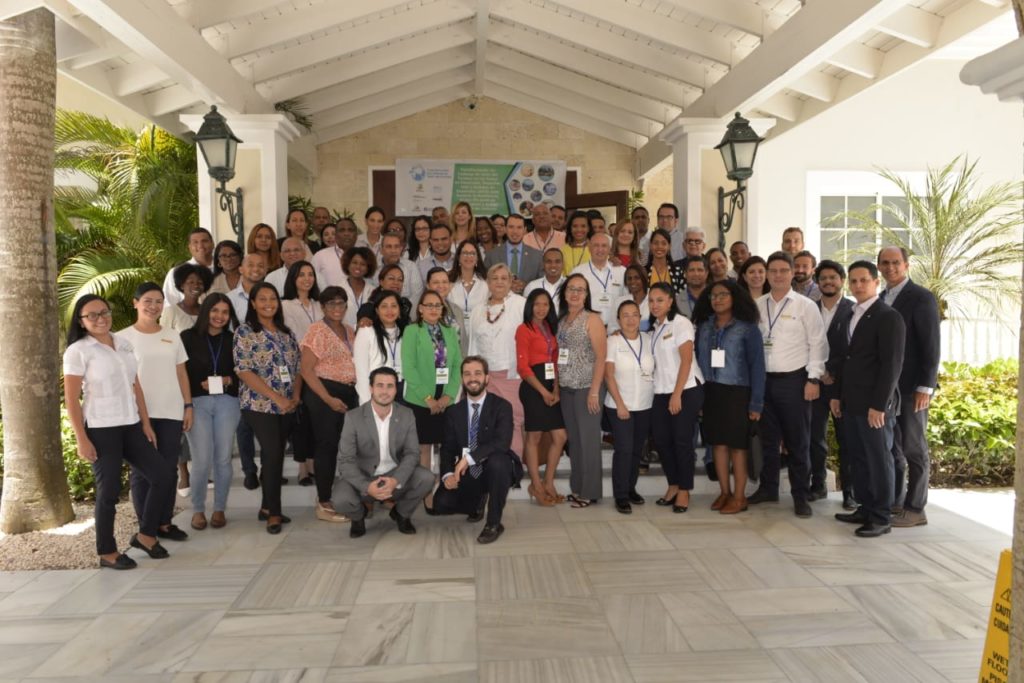
On 14 – 15 May 2019, the Caribbean Cooling Initiative (C-COOL) coordinated by UN Environment’s United for Efficiency initiative (U4E) outlined a strategy for transforming the Dominican Republic’s market for refrigeration, air conditioning, and other “cooling” solutions. An innovative financial mechanism was also launched with an aim to make clean and efficient air conditioners much more affordable.
During a high-level consultation in Santo Domingo with Ministries of Environment and Natural Resources, Energy and Mines, Tourism and a variety of key stakeholders, such as the Dominican association of air conditioning and refrigerator technicians (ADOMTRA) and the association of mechanical contractors (ACMERD), the council of free trade zones and exports among others, U4E presented a first draft of a proposed National Cooling Strategy for the country. The strategy identifies a holistic approach to transitioning the market toward cooling solutions that save consumers money on their electricity bills and have a far lower impact on the electricity grid and the environment.
In the months ahead, the participants will refine the Strategy, which includes new rules on the performance of refrigerators and air conditioners, energy labelling requirements, and a variety of other policy and programmatic recommendations. The aim is to accelerate the switch to better approaches in meeting the Dominican Republic’s cooling needs, which if unattended will led to an augmentation of almost twice the electricity required to power household refrigerators and room air conditioners by 2040. This approach will benefit consumers and ensure the country is on a path to fulfil its goals under the Paris Climate Agreement and the Kigali Amendment to the Montreal Protocol.
According to Elías Gómez, director of the Ozone Layer Protection Program of the Ministry of Environment, “It is crucial for the Dominican Republic to establish a pathway to reduce refrigeration and air conditioning’s environmental impact and its electrical consumption. We want to set ambitious goals that will unlock benefits for the country and to do so in conjunction with the preparatory work we are developing for the ratification of the Kigali Amendment.”
In the framework of this initiative, 80 representatives of the hotel sector participated in the 4th Workshop “Transformando las Cadenas de Valor del Turismo,” an event in Punta Cana, where a new financial mechanism named “CaaS” Cooling as a Service was launched. CaaS allows customers to simply pay for the amount of air conditioning they use instead of buying and maintaining the equipment.
Tourism is one of the main drivers of the economy with a total contribution to GDP of nearly 20 per cent[1]. A switch to better cooling solutions, which currently consumes approximately half of the electricity used by the sector, would have profound impacts on the economic competitiveness and environmental footprint of hotels. Cooling has been identified in previous workshops with tourism stakeholders as one of the highest priorities to accomplish resource efficiency and low-carbon development.
According to Roberto Borjabad from the Latin America and the Caribbean Office of UN Environment and lead representative of U4E, “Keeping buildings cool and comfortable can be very energy intensive. Through United for Efficiency’s Caribbean Cooling Initiative, we are pleased to launch a financial mechanism that can help accelerate the transition to solutions that will save businesses reduce their electricity consumption and their impact to the environment.”
CaaS arises from the collaboration between the Basel Agency for Sustainable Energy and the Japanese company Daikin, a world leader in Air Conditioning. This opportunity is open to additional companies that may be interested, with an aim to scale-up the adoption of the financial mechanism broadly throughout the Dominican Republic market, and beyond.
“The CaaS model is part of the new era of services innovated and oriented to the user, with an emphasis on energy efficient and environmentally friendly technologies that yield economic savings.
The service provider assumes the investment to install the air conditioning system, conducts maintenance, operations, and monitoring of the system, giving a superior experience for the Hotel owner and guests.
The cooling is sold to the hotel at a fixed rate during the years that the contract is agreed. At the end of the contract, the hotel can renovate it, request an extension of time or purchase the equipment” – Explained Rogerio Adelino, Director of Financial Services for Daikin Applied Americas Inc.
C-COOL is led by U4E, with financial mechanism expertise from the Basel Agency for Sustainable Energy, policy analysis by Lawrence Berkeley National Laboratory, and funding support from the Kigali Cooling Efficiency Program According to U4E’s Brian Holuj, “We look forward to showcasing the Dominican Republic’s progress under C-COOL as a model for other island states around the world that are seeking sustainable and cost-effective cooling solutions.” Fellow participants in C-COOL include Barbados, the Bahamas, Jamaica and Saint Lucia.
Download flyers: